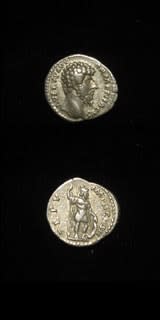Silver Denarius of Emperor Lucius Verus, 161 CE - 169 CE
Silver
C.4120
Obverse: L VERVS AVG ARMENIACVS; Bust of the Emperor Facing Righ Reverse: TR P V IMP II COS II; Mars Standing to the Right, Wearing Military Garb, Holding a Shield...
Obverse: L VERVS AVG ARMENIACVS; Bust of the Emperor Facing Righ
Reverse: TR P V IMP II COS II; Mars Standing to the Right, Wearing Military Garb, Holding a Shield and a Spea
Lucius Verus was the son of Hadrian's adopted heir, Aelius Caesar and was only eight years old when his father died. When Hadrian adopted Antoninus Pius as his heir to the throne, part of the agreement was that Antoninus would adopt Lucius Verus as well as Marcus Aurelius. When Marcus Aurelius became emperor upon the death of Antoninus Pius, Verus became his co-emperor. Lucius Verus married Marcus Aurelius' fifteen-year-old daughter in 164 A.D., which strengthened the family ties even further. Lucius Verus is remembered for being a fairly successful military conqueror and hero. He conquered both Armenia and Medea, and even invaded the Parthian capital of Ctesiphon at a time when Parthia was one of Rome's greatest rivals. It was during the reign of Marcus Aurelius and Lucius Verus that the plague was brought back to Rome from the East by one of the returning armies. Many citizens died in the tragic epidemic. In January of 169 A.D., on the road back from a successful campaign along the Danube, Verus succumbed to a fatal stroke.
How many hands have touched a coin in your pocket or purse? What eras and lands have the coin traversed on its journey into our possession? As we reach into our pockets to pull out some change, we rarely hesitate to think of who might have touched the coin before us, or where the coin will venture to after it leaves our hands. More than money, coins are a symbol of the state that struck them, of a specific time and location, whether contemporary currencies or artifacts of a long forgotten empire. This stunning hand-struck coin reveals an expertise of craftsmanship and intricate sculptural detail that is often lacking in contemporary machine-made currencies. This ancient coin is a memorial to an emperor’s reign passed from the hands of civilization to civilization, from generation to generation that still appears as vibrant today as the day it was struck.
Reverse: TR P V IMP II COS II; Mars Standing to the Right, Wearing Military Garb, Holding a Shield and a Spea
Lucius Verus was the son of Hadrian's adopted heir, Aelius Caesar and was only eight years old when his father died. When Hadrian adopted Antoninus Pius as his heir to the throne, part of the agreement was that Antoninus would adopt Lucius Verus as well as Marcus Aurelius. When Marcus Aurelius became emperor upon the death of Antoninus Pius, Verus became his co-emperor. Lucius Verus married Marcus Aurelius' fifteen-year-old daughter in 164 A.D., which strengthened the family ties even further. Lucius Verus is remembered for being a fairly successful military conqueror and hero. He conquered both Armenia and Medea, and even invaded the Parthian capital of Ctesiphon at a time when Parthia was one of Rome's greatest rivals. It was during the reign of Marcus Aurelius and Lucius Verus that the plague was brought back to Rome from the East by one of the returning armies. Many citizens died in the tragic epidemic. In January of 169 A.D., on the road back from a successful campaign along the Danube, Verus succumbed to a fatal stroke.
How many hands have touched a coin in your pocket or purse? What eras and lands have the coin traversed on its journey into our possession? As we reach into our pockets to pull out some change, we rarely hesitate to think of who might have touched the coin before us, or where the coin will venture to after it leaves our hands. More than money, coins are a symbol of the state that struck them, of a specific time and location, whether contemporary currencies or artifacts of a long forgotten empire. This stunning hand-struck coin reveals an expertise of craftsmanship and intricate sculptural detail that is often lacking in contemporary machine-made currencies. This ancient coin is a memorial to an emperor’s reign passed from the hands of civilization to civilization, from generation to generation that still appears as vibrant today as the day it was struck.



